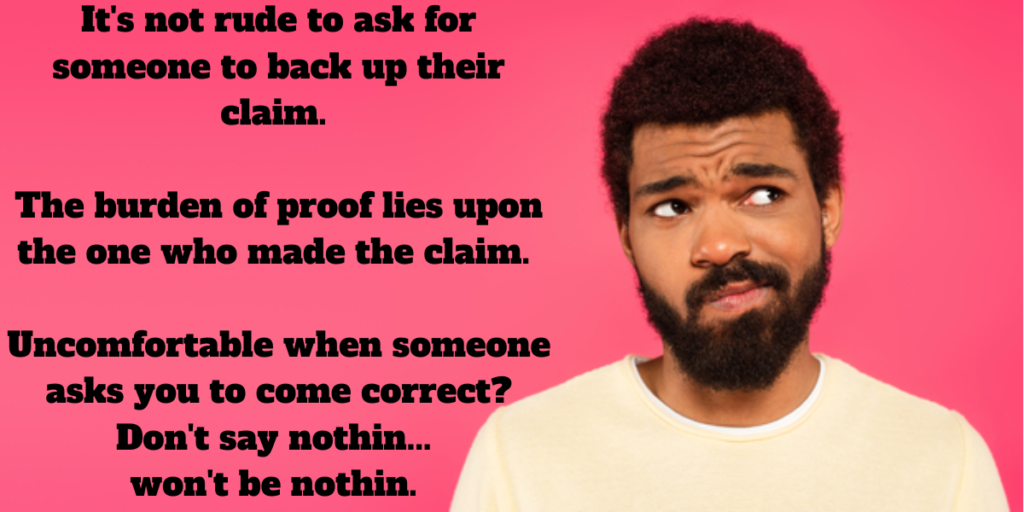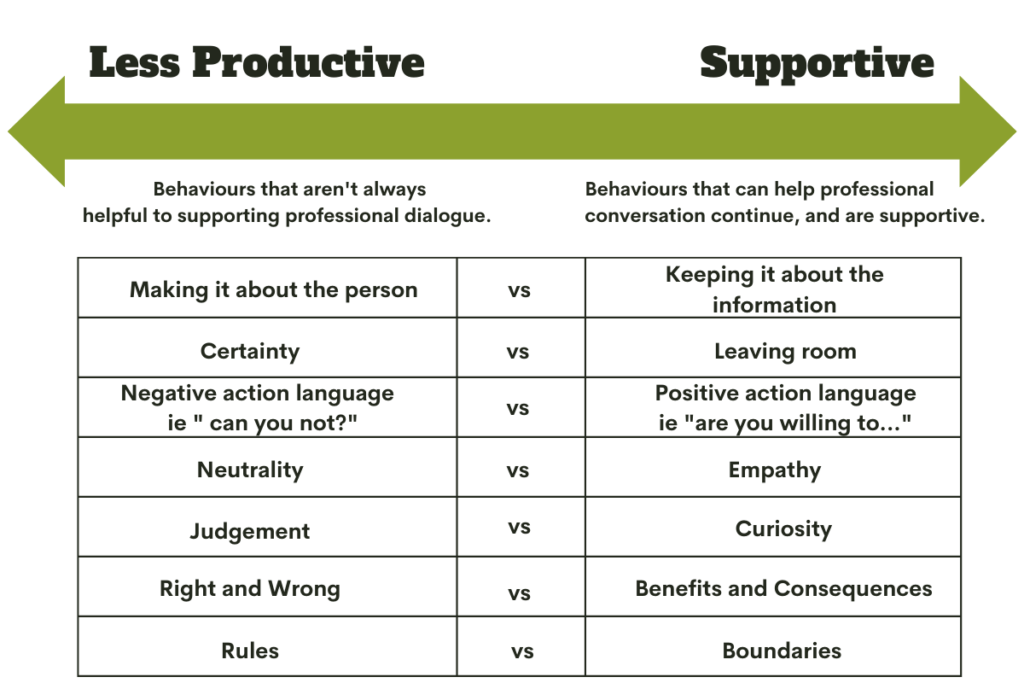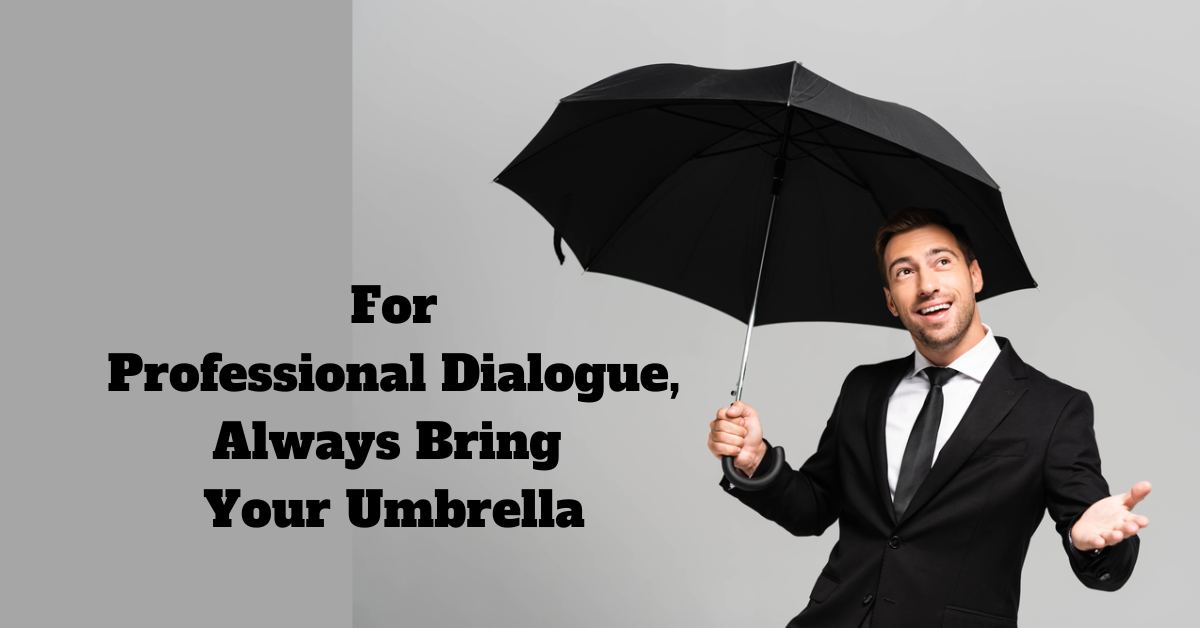Name calling is unprofessional, and it sours the ‘vibe’.
I know there’s a lot of people who tap out of a conversation because the vibe wasn’t good for them. I get it.
Okay, let’s go because there’s a few things to unpack here.
Culture
Poor form
What should we do about it?
On culture.
In this section, in order to make myself clear, I will use more extreme examples, but in reality I think that most people function somewhere in the middle. I just wanted to start with that disclaimer, incase I sound like one of those blowhards that start rants with ‘there’s two kinds of people in this world’ because that’s unhelpful, untrue, and divisive.
Here’s an interesting article that calls some of this “Ask Culture” and “Guess Culture”.
I grew up steeped in a culture that values and prioritizes direct communication to a point where if you’re not used to it could seem rude, insulting, strident, or just cocky. This stems from a particular set of values which drives a particular communication style. Those values are baked in because of socio-economic, educational, and cultural factors.

Others who are on the other end of the spectrum appear to be so concerned about other people’s feelings that they avoid telling people what they really think. They can be indirect to the point of appearing passive-aggresive or having hidden intentions. That’s it’s own kind of rude.
So…what do we do?
Imagine that everyone is on a scale of – 10 to + 10. People who are more direct in their communication style are on the + side, and people who are more passive in their communication style are on the minus side. (No value is assigned here. Just to be clear…I’m not suggesting that one way of communication is observably ‘better’).
Now, imagine that people have about a 3-5 point comfort zone in either direction.
Me? I’m about a 7. My range of optimum comfort is about +3- +10.
If I’m talking to someone who’s range is around a -3 to +2, we can make it work. Both of us will be stretching a little, but we’ll be okay.
I find it difficult to have conversations with people who’s comfort zone is around a -7, or way on the other end of the spectrum. Maybe if we both have patience for each other, we’ll have a chance, but it’s really challenging.
Honestly….professional discourse can be really challenging, but if we all are committed to ‘stretching’ our comfort zone a little, I think we have an opportunity to really get somewhere.
Let’s try a little patience, ya?

Poor form.
Can we just start from a place that everyone is allowed to lose their shit sometimes? If we wrote people off anytime they displayed immature, childish, petulant, or otherwise shitty behaviour….I mean…who’d be left for us to talk to?!
I think it’s own our best interest to have strong personal boundaries, and let people know when something is not working for us. Perhaps a post about boundaries vs rules can be unpacked on another post.
Things like name calling or being rude really destroy the quality of the conversation. 2 big things stick out to me…
One thing I find really unfortunate is that a lot of people who might have something valuable to add to the conversation can ‘tap out’ because they just don’t like the vibe. This causes lack of diversity in opinion being expressed and that is to everyone’s disadvantage.
It’s not our job to always be adjusting the vibe for other people’s comfort, but maybe we can try just a little.

.
The person engaging in name calling may be dancing with a couple of logical fallacies here.
Simply put, these are errors in thinking, where you’d think that it makes sense, but it really doesn’t.
2 stick out to me when people are name calling.
They could be attacking someone’s character in order to try and diminish the point that their opponent is trying to make.
There’s a couple of things that are wrong with this….
If you’re attacking another person’s character in order to try and win an argument….wow buddy…you need to ease off.
However…even if we excuse poor behaviour, and look at the actual point of discussion, the second thing that may even be more important is that it doesn’t even have anything to do with the argument. That’s what I like to focus on when people are being ass-hats. Does it even apply to the point of the discussion? If it doesn’t I just ignore the name calling, or other poor behaviour, while redirecting them to the point of the convo. Just my style.
I get it if you don’t have the patience for that. I don’t always either.
So what should we do?
Invite them to be descriptive.
Invite them to be specific.
If someone is engaging with low blows like going after someone’s character, or name calling, just ask them if they’re willing to expand on why they feel that way.

Keep in mind that just because someone is being a dick-head doesn’t mean that they’re wrong. They’re unfortunately failing to get their message across because if they’re overtly rude, most people won’t listen to them…unless that’s their schtick because the internet flocks to drama like binging a whole season of Below Deck.
If you invite people to be descriptive, specific, and back up what they’re saying with references….now that’s being a shepherd of dialogue. It takes patience, thick skin, and a willingness to carry an umbrella for the shit-storm
of drama that can arise because hey….we’re all human.
Like I said, I think it’s better if we all carry an umbrella (of patience) and are willing to put up with each other’s crap at least a little for the sake of progress.
In my experience (for what little that is worth), when you invite people to be descriptive, they either self-correct, or run out of steam.
Some paraphrasing and asking for confirmation can really help too.
Scenario A

A: Well, that practitioner is just a crack-pot nucca Chiro, and therefore everything that they say is horse-shit.
B: Are you willing to expand on why what this person said is indefensible?
A: The very concept of vitalism in chiropractic has no evidence base, and here’s a few papers that discuss the lack of support for any of it’s fundamental theories.
Diffused!
Scenario B
A: You know…that fascial nonsense is just that. I don’t know how any practitioner could believe in such crap, or practice that way.
B: Are you willing to elaborate on why you think that fascial narratives are ‘such crap’? What I’m hearing you say is that all people who practice within a fascial narrative are ‘crap’ practitioners. Is that right?
A: Well…look…I’m not saying that people who practice fascial techniques are crap practitioners…I’m just saying that some of the narratives behind fascial release aren’t supported by any evidence. This might be a case of people doing the right thing….and that it’s working…just not for the reasons that they thought.
Diffused!
No…we don’t have to respect each other’s opinion.
Yes we can respect the human at the same time.
Yes, we can still be friends.
Remember that when you ask for evidence to support what someone’s saying it’s not rude. It’s curious.
It’s as simple as this….
A: Hey…I think this thing?!
B: Really? Neat! Hmmmm…Why do you think that?
A: Oh…these good reasons over here.
B: Hmm… interesting. Here’s why I think those reasons may have some challenges, and why we might not be able to draw a conclusion.
A: Hmmm…good point. I only read the abstract. I’ll look into it more, but let’s keep this convo going, because I’d really like to see if we can close the loop on this!
Let’s try to stick to the point, keep each other accountable, and always carry your umbrella.
Peace out fam. Much love.


